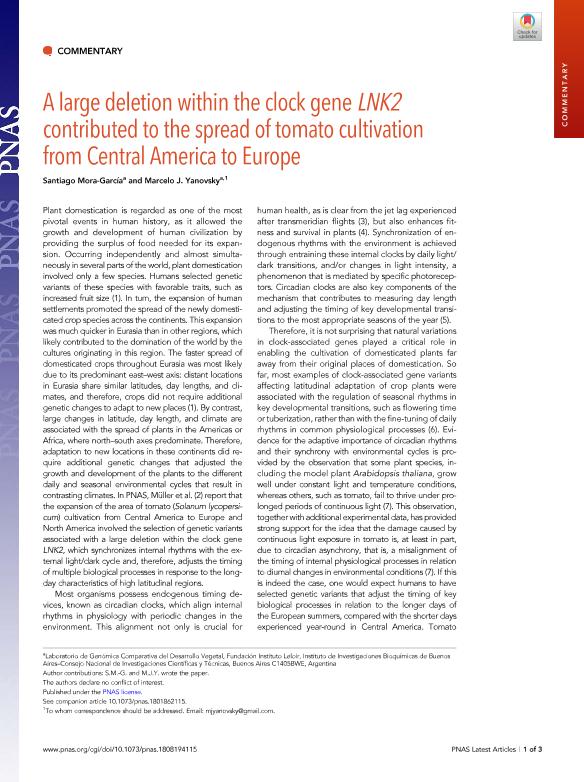Artículo
A large deletion within the clock gene LNK2 contributed to the spread of tomato cultivation from Central America to Europe
Fecha de publicación:
07/2018
Editorial:
National Academy of Sciences
Revista:
Proceedings of the National Academy of Sciences of The United States of America
ISSN:
0027-8424
Idioma:
Inglés
Tipo de recurso:
Artículo publicado
Clasificación temática:
Resumen
Plant domestication is regarded as one of the most pivotal events in human history, as it allowed the growth and development of human civilization by providing the surplus of food needed for its expansion. Occurring independently and almost simultaneously in several parts of the world, plant domestication involved only a few species. Humans selected genetic variants of these species with favorable traits, such as increased fruit size (1). In turn, the expansion of human settlements promoted the spread of the newly domesticated crop species across the continents. This expansion was much quicker in Eurasia than in other regions, which likely contributed to the domination of the world by the cultures originating in this region. The faster spread of domesticated crops throughout Eurasia was most likely due to its predominant east?west axis: distant locations in Eurasia share similar latitudes, day lengths, and climates, and therefore, crops did not require additional genetic changes to adapt to new places (1). By contrast, large changes in latitude, day length, and climate are associated with the spread of plants in the Americas or Africa, where north?south axes predominate. Therefore, adaptation to new locations in these continents did require additional genetic changes that adjusted the growth and development of the plants to the different daily and seasonal environmental cycles that result in contrasting climates. In PNAS, Müller et al. (2) report that the expansion of the area of tomato (Solanum lycopersicum) cultivation from Central America to Europe and North America involved the selection of genetic variants associated with a large deletion within the clock gene LNK2, which synchronizes internal rhythms with the external light/dark cycle and, therefore, adjusts the timing of multiple biological processes in response to the long-day characteristics of high latitudinal regions.
Palabras clave:
Crop Domestication
,
Circadian clock
,
Tomato
Archivos asociados
Licencia
Identificadores
Colecciones
Articulos(IIBBA)
Articulos de INST.DE INVEST.BIOQUIMICAS DE BS.AS(I)
Articulos de INST.DE INVEST.BIOQUIMICAS DE BS.AS(I)
Citación
Mora Garcia, Santiago; Yanovsky, Marcelo Javier; A large deletion within the clock gene LNK2 contributed to the spread of tomato cultivation from Central America to Europe; National Academy of Sciences; Proceedings of the National Academy of Sciences of The United States of America; 115; 27; 7-2018; 6888-6890
Compartir
Altmétricas




